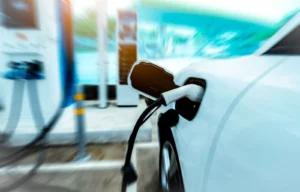Electric car batteries with range similar to internal combustion engines and which can charge in as little as 12 minutes are among projects awarded over £91 million of government and industry funding as part of plans to to develop the latest green automotive technology.
Four projects have been awarded funding through the Advanced Propulsion Centre (APC) Collaborative Research and Development competition, which supports the development of innovative low carbon automotive technology. Together they could save almost 32 million tonnes of carbon emissions, equivalent to the lifetime emissions of 1.3 million cars, and secure over 2,700 jobs across the country.
These innovations will address motorists’ concerns about adopting electric vehicles by cutting charge times and boosting driving range. They will help to make electric vehicles more affordable, efficient and convenient.
The projects awarded funding today are:
- BMW-UK-BEV, Oxford – £26.2 million to develop an electric battery that will rival the driving range of internal combustion engines, helping put concerns over how far electric vehicles can travel to rest
- Project CELERITAS, Birmingham – £9.7 million to create ultra-fast charging batteries for electric and fuel cell hybrid vehicles that can charge in as little as 12 minutes
- the BRUNEL project, Darlington – £14.6 million to develop a novel zero emission, hydrogen-fuelled engine to help decarbonise heavy goods vehicles
- REEcorner, Nuneaton – £41.2 million to radically redesign light and medium-sized commercial electric vehicles in Nuneaton by moving the steering, breaking, suspension and powertrain into the wheel arch enabling increased autonomous capability, storage space and design flexibility
Minister for Investment Lord Grimstone said: “By investing tens of millions in the technology needed to decarbonise our roads, not only are we working hard to end our contribution to climate change, but also ensuring our automotive sector has a competitive future that will secure thousands of highly-skilled jobs.
“Seizing the opportunities that arise from the global green automotive revolution is central to our plans to build back greener, and these winning projects will help make the widespread application and adoption of cutting-edge, clean automotive technology a reality.”
The government has already announced the end of the sale of new petrol and diesel cars in the UK by 2030, putting the UK on course to be the fastest major economy to decarbonise cars and vans, and is currently consulting on phasing out the sale of new diesel and petrol heavy goods vehicles (HGVs) by 2040, as set out in the government’s Transport Decarbonisation Plan. The projects awarded funding today will help make the technological developments needed to meet these goals.
CEO at the Advanced Propulsion Centre Ian Constance said: “These projects tackle some really important challenges in the journey to net-zero road transport. They address range anxiety and cost, which can be a barrier to people making the switch to electric vehicles and they also provide potential solutions to the challenge of how we decarbonise public transport and the movement of goods.
“By investing in this innovation, we’re taking these technologies closer to the point where they are commercially viable, which will strengthen the UK’s automotive supply chain, safeguard or create jobs and reduce harmful greenhouse emissions.”
























